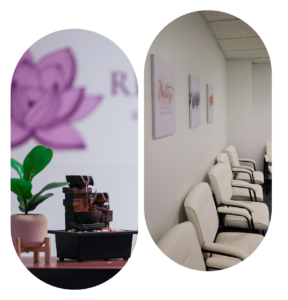OCD and Addiction Treatment with Resilience Behavioral Health in Boston
 Obsessive-Compulsive Disorder (OCD) and addiction frequently intersect in ways that complicate the path to recovery. For individuals with OCD, the constant cycle of intrusive thoughts and compulsive behaviors can be overwhelming, leading some to turn to substances as a way to find temporary relief. However, substance use only masks these symptoms, often intensifying the distress and creating a cycle of dependency that’s challenging to break alone. Resilience Behavioral Health in Boston offers specialized treatment programs that address both OCD and addiction, providing a comprehensive approach to help individuals regain control over their lives.
Obsessive-Compulsive Disorder (OCD) and addiction frequently intersect in ways that complicate the path to recovery. For individuals with OCD, the constant cycle of intrusive thoughts and compulsive behaviors can be overwhelming, leading some to turn to substances as a way to find temporary relief. However, substance use only masks these symptoms, often intensifying the distress and creating a cycle of dependency that’s challenging to break alone. Resilience Behavioral Health in Boston offers specialized treatment programs that address both OCD and addiction, providing a comprehensive approach to help individuals regain control over their lives.
At Resilience Behavioral Health, treatment is customized to meet the unique needs of those struggling with both OCD and addiction. Using evidence-based therapies like cognitive-behavioral therapy (CBT) and exposure and response prevention (ERP), the program helps individuals address the underlying causes of OCD while building healthy coping mechanisms for substance use. Through a compassionate and integrated approach, Resilience Behavioral Health equips clients with the tools they need to manage OCD symptoms effectively, break free from addiction, and achieve lasting recovery.
Statistics on OCD and Addiction
Obsessive-Compulsive Disorder affects about 1.2% of the U.S. population, with many cases remaining undiagnosed or inadequately treated. According to the National Institute on Mental Health (NIMH), prevalence rates suggest that approximately 2.3 million adults in the U.S. live with OCD.
Addiction, whether it be to alcohol, drugs, or other substances, is a significant public health crisis. The Substance Abuse and Mental Health Services Administration (SAMHSA) reported that in 2020, nearly 21 million Americans aged 12 and older needed help for substance use disorders.
When OCD and addiction co-exist, the impacts are compounded. Research shows that around 25% of those with OCD also have a substance use disorder (SUD). Addressing these conditions together, therefore, is imperative for holistic recovery.
The Signs & Symptoms of OCD
Obsessive-Compulsive Disorder (OCD) is marked by a cycle of persistent, intrusive thoughts (obsessions) and repetitive behaviors or mental acts (compulsions) aimed at reducing the distress caused by these thoughts. Understanding the signs and symptoms of OCD can help in recognizing the condition and seeking appropriate support.
- Obsessions: These are unwanted, repetitive thoughts, images, or urges that cause significant anxiety or discomfort. Common obsessions include fears of contamination, unwanted aggressive thoughts, fears of harming others, or an overwhelming need for symmetry and order. These thoughts often intrude on daily activities and are difficult to control, even when recognized as irrational.
- Compulsions: In response to obsessions, individuals with OCD feel compelled to perform certain actions or mental rituals repeatedly to relieve the anxiety triggered by these thoughts. Compulsions might include excessive hand-washing, checking locks, counting items, arranging things in a specific order, or silently repeating certain phrases. These behaviors provide temporary relief but reinforce the obsessive cycle, making it difficult to break.
- Time-Consuming Routines: For many, OCD routines can consume significant portions of their day, interfering with personal relationships, school, or work. The need to repeat actions until they feel “right” or to follow rigid routines can lead to frustration, isolation, and reduced quality of life.
- Emotional Distress: The intensity of obsessions and compulsions often leads to emotional distress. People with OCD may experience shame, frustration, or embarrassment over their behaviors and thoughts, which can contribute to feelings of hopelessness, depression, and anxiety.
- Avoidance Behaviors: Many individuals with OCD avoid certain people, places, or situations that might trigger their obsessions or compulsions. For example, someone with contamination fears might avoid public spaces or refuse physical contact with others, which can affect their social life and relationships.
Recognizing these symptoms early can be crucial in seeking effective treatment, as specialized therapies, such as cognitive-behavioral therapy (CBT) and exposure and response prevention (ERP), can help individuals manage OCD and improve their quality of life.
 How OCD Can Impact Addiction
How OCD Can Impact Addiction
OCD is characterized by persistent, unwanted thoughts (obsessions) and repetitive behaviors or mental acts (compulsions) aimed at reducing distress or preventing feared events. These compulsions can be debilitating, leading individuals to seek relief through substance use. Drugs and alcohol may temporarily alleviate OCD symptoms, creating a vicious cycle of dependence and exacerbation.
The interplay between OCD and addiction typically undermines standard treatment approaches. For instance, a person with OCD may abuse prescription medications, exacerbating both their addiction and OCD symptoms. Hence, specialized treatment that addresses both conditions concurrently is crucial.
Types of Programs For Addiction and OCD Treatment in Boston
Resilience Behavioral Health in Boston offers a comprehensive range of addiction and OCD treatment options, carefully designed to meet varying needs and recovery stages. Their outpatient treatment program suits individuals with milder symptoms, allowing them to live at home while attending several therapy sessions each week. This level of care provides essential support and guidance while giving patients the flexibility to continue with their daily responsibilities.
For those who need more structure, the Intensive Outpatient Program (IOP) offers a step up from traditional outpatient services. IOP includes more frequent sessions and a higher level of engagement, making it ideal for those who require added support without the need for 24-hour care. Partial Hospitalization Programs (PHP) provide even more intensive daily therapeutic interventions but still allow patients to return home each evening. This program bridges the gap between inpatient and outpatient care, delivering structured treatment for individuals who need consistent, daily support.
At the highest level of care, Resilience Behavioral Health offers inpatient or residential treatment for those with severe OCD and addiction. This immersive, round-the-clock program provides a stable, supportive environment, allowing individuals to focus fully on their recovery. Through a structured setting with access to comprehensive therapeutic interventions, patients receive the highest level of support to address their symptoms and begin the path to healing.
Types of Therapies Used At Our OCD and Addiction Treatment Facility in MA
Resilience Behavioral Health in Boston brings together a variety of evidence-based therapies to address the unique needs of individuals struggling with OCD and addiction. Cognitive Behavioral Therapy (CBT) serves as a foundational approach, helping patients identify and challenge harmful thought patterns that contribute to their symptoms. By reshaping these thoughts and developing healthier behaviors, CBT provides lasting tools for managing both addiction and OCD.
A key technique within CBT, Exposure and Response Prevention (ERP), gradually helps individuals confront fears and anxieties associated with OCD. Through this exposure, patients learn to resist their usual compulsive responses, reducing the power of their obsessions over time. For those dealing with substance use disorders, Medication-Assisted Treatment (MAT) combines medication with therapeutic counseling to help manage cravings, making it easier to focus on recovery and sustain sobriety long-term.
To further support emotional well-being, Resilience Behavioral Health also incorporates Dialectical Behavior Therapy (DBT), which emphasizes mindfulness and distress tolerance to help individuals regulate emotions and navigate stress. Group therapy sessions offer a space for patients to share their experiences and find comfort and understanding from others facing similar challenges. Family therapy helps strengthen the individual’s support network by repairing relationships and fostering a more cohesive recovery environment. Additionally, holistic therapies—such as mindfulness practices, yoga, and art therapy—round out the treatment approach, enhancing emotional resilience and overall wellness.
Types of Medications Used in OCD and Addiction Treatment in Boston
Medications play a crucial role in treating both OCD and addiction:
Selective Serotonin Reuptake Inhibitors (SSRIs): SSRIs, like fluoxetine and sertraline, are commonly prescribed to reduce OCD symptoms by increasing serotonin levels in the brain.
Anti-Anxiety Medications: Benzodiazepines may be prescribed for short-term relief of severe anxiety but are used cautiously due to their potential for addiction.
Antipsychotics: Medications such as risperidone may be used to augment SSRIs for treatment-resistant OCD.
Medications for Addiction:
- Methadone: Used for opioid addiction, methadone reduces cravings and withdrawal symptoms.
- Buprenorphine: Another medication for opioid addiction, buprenorphine offers similar benefits as methadone but with a lower risk of misuse.
- Naltrexone: Used for both alcohol and opioid addiction, naltrexone blocks the euphoric effects of substances.
- Disulfiram: For alcohol dependence, disulfiram causes adverse reactions when alcohol is consumed, deterring use.
Paying For MA OCD and Addiction Treatment Programs
Navigating the financial aspects of treatment can be daunting. Resilience Behavioral Health’s OCD and addiction treatment in Boston offers multiple payment options to ensure accessibility:
- Insurance: Many insurance plans cover mental health and addiction treatment. It’s essential to verify the specifics of your plan to understand coverage, copayments, and deductible requirements.
- Sliding Scale Fees: Based on income and financial situation, sliding scale fees provide more affordable options for those with limited resources.
- Payment Plans: Flexible payment plans allow patients to spread the cost of treatment over time, making it more manageable.
- Employee Assistance Programs (EAP): Some employers provide EAPs that include mental health and addiction treatment services for employees.
Get Compassionate & Effective OCD and Addiction Treatment in Boston Today
If you or a loved one is struggling with OCD and addiction, know that help is available, and recovery is possible. At Resilience Behavioral Health in Boston, we understand the complexities of these co-occurring disorders and offer comprehensive, evidence-based care designed to meet your unique needs. With our dedicated team of professionals and a robust support system, you can embark on the path to recovery and reclaim your life.
Don’t wait another day to seek the help you deserve. Contact Resilience Behavioral Health in Boston today to learn more about our OCD and addiction treatment programs. Take the first step towards a brighter future—call us now.

 How OCD Can Impact Addiction
How OCD Can Impact Addiction